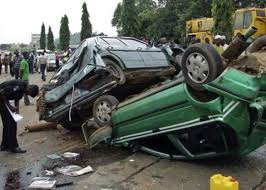Eight Lives Lost Daily: Why Ghana Must Treat Road Safety as a National Emergency
Eight Ghanaians do not make it home every day because of road crashes. That is not an abstract statistic; it’s eight empty seats at dinner tables every single day. Statistics from the National Road Safety Authority (NRSA) for January–June 2025 show 7,289 reported crashes involving 12,354 vehicles, injuring over 8,300 people and killing 1,504, more lives lost in six months than Ghana recorded during the entire COVID-19 pandemic. This is a national emergency, and it demands a legislative, regulatory and enforcement response with the same urgency we would give to any public-health crisis.
The Cost of Inaction
When the National Road Safety Authority (NRSA) says we are losing an average of eight lives daily, we should treat that as a call to arms. Eight a day is not fate; it’s the predictable outcome of gaps in law, weak enforcement, poor vehicle and road standards, and fragmented accountability. In a 24-hour economy where people and goods will move at all hours, those gaps will widen unless Parliament and regulators take the appropriate steps. Night-time and early-morning travel carry higher risks: fatigue, speed, alcohol, and low visibility combine into a deadly mix. If we expand round-the-clock activity without strong safety rules and enforcement, we will expand the times and places where crashes occur.
What the Law must do, Clearly and Quickly
Adopt a “Safe System” approach in law. Road safety design are part of every road design; however, during road construction, they are omitted and the same people who ignored the safety designs become victims of their own action and inaction. Make safety a design requirement on roads, in vehicles, and at speeds, rather than relying only on perfect human behaviour. This means statutory speed management, safer street design (traffic calming, street light functioning, pedestrian islands, protected shoulders), mandatory safety audits for all new or rehabilitated roads, and routine maintenance that prioritizes high-risk corridors and junctions.
Set and enforce firm speed limits with automated enforcement. Speed is the single most crucial factor in whether a crash becomes a fatality or not. According to the National Road Safety Authority, excessive speeding contributes to 60% of road crashes leading to deaths, pedestrian and passenger knockdowns. Speeding has become the lone ranger in killing people, maiming them, and destroying property. Worldwide evidence shows that speed cameras, when deployed transparently and fairly, reduce injury crashes and deaths. The attempt to amend Road Traffic Regulation LI 2180 to allow for automated speed enforcement is still in limbo.
Close the safety-gear loopholes. Effective helmet and seat-belt laws save lives. The law must require standards-certified motorcycle helmets (with a national conformity regime so only safe helmets are sold), rear and front seat-belt use, and child restraints, with penalties that deter. Complement the law with roadside checks and low-cost distribution/financing of compliant gear.
Zero tolerance for drink- and drug-driving backed by evidence tools. Mandating the police to undertake regular random breath testing and roadside sobriety checks, with lower blood-alcohol limits for commercial, night-shift, and novice drivers, can help limit the culture of binge driving. Ghana’s blood alcohol content (BAC) level is in excess of international best standards. Addressing binge driving will not be complete without bringing it to a level that makes driving safer for both the driver and other road users.
Professionalize commercial transport. The NRSA law mandates the Codification of minimum hours-of-service and rest breaks for truck, bus, and ride-hail drivers; require electronic logging for fleets above a defined size; license and audit transport companies for safety management; and enforcement has become very low due to underfunding of the NRSA. In a 24-hour economy, fatigue management is non-negotiable.
Why this matters even more under a 24-hour Economy
Ghana’s 24-hour economy vision promises jobs, productivity, and better use of infrastructure. But the same round-the-clock movement raises exposure during the riskiest hours. A strong legal framework enables the country to reap economic benefits without sacrificing lives. By establishing safe speeds at night, implementing fatigue rules for shift workers, designing safe routes for industrial zones and markets, and ensuring predictable, automated enforcement that operates 24/7. If we legislate safety into the 24-hour model, we set ourselves up for inclusive growth; if we ignore it, we will multiply today’s tragedy by tomorrow’s traffic volumes. The outcome is an increase in crashes and fatalities.
What the world has learned and Ghana can Adapt
Sweden’s Vision Zero made safety the top design goal and aligned laws, engineering, and enforcement accordingly. Over time, Sweden more than halved road deaths while traffic volumes rose, proving that systematic, law-backed safety works. Ghana can legislate its own Vision Zero target and plan, tailored to our roads and risks.
Speed cameras save lives when used fairly. International reviews find consistent reductions in injury crashes where cameras are deployed. Our law should require community consultation, signage, independent calibration, privacy safeguards, and public dashboards so that the focus is on safety, not revenue.
World Health Organization best practice is clear: enforce helmet, seat-belt, child-restraint and drink-driving laws; manage speed; and improve post-crash care. Countries that put these into law and enforce them see fewer funerals and fewer disabilities.
A simple bargain with the Ghanaian public
Ghanaians will accept tougher rules if they see fairness and results. That’s why the legislative package must hard-wire transparency: where cameras are placed, how fines are used, which junctions will be redesigned next, and how many minutes an ambulance should take to arrive. Publish the numbers. Fix the hotspots. Show the lives saved.
We should be honest, persuading every driver to behave perfectly is impossible. Designing a system that anticipates mistakes and prevents them from becoming fatal is possible. Parliament should treat NRSA’s 2025 figures as a wake-up call and pass amendments to the Road and Traffic Act to align with global best practice, alongside regulations that give the Police, MMDAs, and transport regulators the tools to enforce it, day and night.
Eight a day is not inevitable. With smart laws, firm enforcement, and safer streets, we can make “arrive safely” the norm in Ghana’s 24-hour economy, not the exception.
The writer is a development professional with CUTS International, Accra. For more information visit www.cuts-accra.org or email sny@cuts.org








